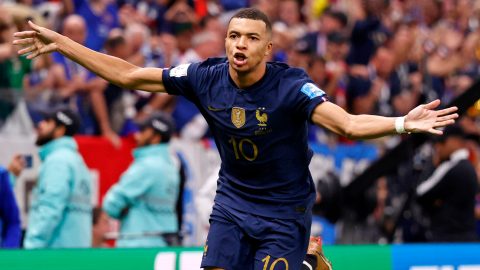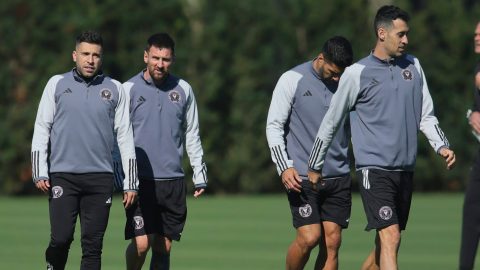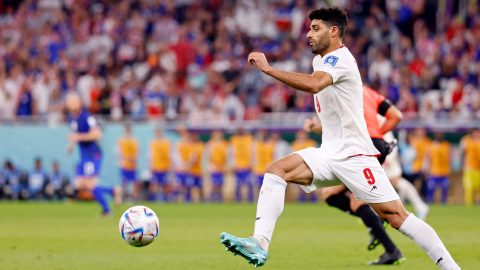 Bayern Munich-Borussia Dortmund was an “instant classic” long before Arjen Robben scored the winning goal in the 89th minute.
Bayern Munich-Borussia Dortmund was an “instant classic” long before Arjen Robben scored the winning goal in the 89th minute.
The dramatic conclusion of the 2012-13 UEFA Champions League final was merely the exclamation point on a game that will go down in history as one of the best-ever finals of a major soccer tournament.
It was no accident that the first all-German Champions League final was such a thriller. The way it unfolded was the product of a rivalry that was put to flame in 2008, simmered in 2010 and 2011 and reached its boiling point on Saturday. That the final took place at Wembley Stadium — one of the sacred shrines of world soccer — was both fitting and symbolic.
Recent weeks have seen the Bundseliga (German first division) hailed as the best domestic league on Earth — a model for others to admire and emulate. I’m not ready to crown the German game just yet, as its quality of depth remains in question. However, I’ll freely admit that Bayern and Dortmund are the world’s two best soccer clubs as of spring of 2013.
The two clubs took separate routes to the top, but one thing lies at the heart of both teams’ recent success: German engineering intersected with an essential sports truisms to produce two great teams. Winners often learn their most valuable lessons from defeat, and it is in rising from defeat that they reach their greatest glories. German soccer started this process after the national team crashed out of Euro 2000, according to the Guardian.
“German football is booming, reaping the rewards of the strategy drawn up after their dismal performances at Euro 2000, when Germany finished bottom of their group. Forced into an overhaul of youth football, the DFB [German soccer federation], the Bundesliga and the clubs decided that the development of more technically proficient homegrown players would be in everyone’s best interests. This led to the creation of academies right across the top two divisions.”
Bayern has been a soccer juggernaut since the 1970s. Constant success bred expectation, which wealth often made it possible to meet. Its star-studded teams are among the European elite almost every year, but the current crop of Bayern players experienced something else in order to end the club’s 13-year wait for continental glory. They needed to (repeatedly) feel that sting of defeat and learn from it to win club soccer’s most coveted trophy.
Dortmund is a blue-collar club from a blue-collar city. Its fall and rise took place over the last 15 years, but the same lessons apply. In 2005, it avoided bankruptcy thanks to an emergency loan from Bayern Munich. Dortmund then adopted a new approach to team building. Instead of paying a premium for foreign stars, it focuses on developing local youth and gives them a chance to break into the first team. Jurgen Klopp became the face and leader of the project when he was hired as manager in 2008. Dortmund won the Bundesliga two years later and won league and cup honors in 2011-12.
Dortmund’s domestic success angered Bayern. The juggernaut was further horrified when it lost the 2012 Champions League final to Chelsea in its own stadium. Its players emerged from the shock as a hungrier and more focused group. Club directors reinforced the group with five successful summer signings, and Bayern retook the Bundesliga in record-breaking fashion.
The Champions League was always Bayern’s primary target in 2012-13. Philip Lahm, Bastian Scwheinsteiger, Robben and Franck Ribery were the ring-leaders of a group that had suffered defeat in the final of the 2010 and 2012 Champions Leagues. Those players’ fortunes at every major international tournament since the 2006 FIFA World Cup were startlingly similar to Bayern’s recent finishes. Losing to a domestic rival in 2013 was simultaneously unthinkable and entirely possible.
The current Bayern team was built for domination. It overwhelms opponents with speed, skill, power and tactical maturity as Barcelona learned in the semifinal. Klopp’s Dortmund is the anti-Bayern. It is a young, hungry group which has gone toe-to-toe with Bayern thanks to the spirit of fearlessness and sacrifice which the manager has instilled his players.
On Saturday, Bayern and Dortmund treated (an estimated) 350 million fans around the world to a three-acts of pure soccer theater. Dortmund was the better team for the first 30 minutes but failed to score. The two teams were even for the next 30 and split two goals. Bayern was superior over the last half-hour, and Robben’s goal won the game (just as it looked like extra time was a certainty). The tempo was pulsating throughout and, astonishingly, neither team made a substitution before Robben struck. The contrast in styles was clear. Bayern’s relentless superiority clashed with Dortmund’s suffocating swarm to produce a classic.
Should Bayern Munich beat Stuttgart to win the German cup on June 1, it will have a strong claim to the title of “greatest [single-season] team in history.” Dortmund almost beat the juggernaut, which is telling in itself. How both clubs play, operate and are supported should serve as the guiding lights of the soccer world. They followed separate blueprints but coexisted at the summit for 89 out of 90 minutes.
Both clubs share the brightest of futures, as they hope to meet new challenges in the coming seasons. Dortmund playmaker Mario Gotze is joining Bayern next season. Star striker Robert Lewandowski could follow. Bayern’s underhanded pursuit of the duo will undoubtedly fan the rivalry’s flames to greater heights, and the scorned club will carry that grudge well into the future. Dortmund’s other key players are tied to long-term contracts, and it has the money and scouting network it takes to find suitable replacements for Gotze and Lewandowski. Barring a shock departure from Klopp, it will remain a contender to win the Champions League in the coming seasons.
Bayern is entering a bright new era, as Pep Guardiola will replace the retiring Juup Heynckes as manager. His mandate is to sustain this unprecedented success and help Bayern become the first team to win back-to-back Champions League titles. He must also integrate a few young players into the first team (as he did at Barcelona), heap more responsibility on young star Thomas Muller and help Bayern transition from the era of Lahm, Scwhweinsteiger, Robben and Ribery into the future. Should he be successful, Bayern will set the standard in world soccer for the rest of the decade and beyond. Dortmund will be right on their heels.
Germany’s national team will benefit from all of this. Lahm, Scwhweinsteiger and friends will be eager to match their long-awaited club success with international glory. Germany is a leading contender to win the next three major international tournaments — the 2014 World Cup, the 2016 European Championships and the 2018 World Cup. Muller will lead the next generation of young and experienced German stars into the great beyond.
The eyes of the soccer world must stay fixed on the Germany. It is home to two leading clubs and some of the world’s top players. Its clubs are changing the way the game is played, taught and run. It rose from the ashes of Euro 2000, emphasized youth development and community ownership (and support) of clubs. It resulted in Saturday’s blend of style and substance that produced some of the greatest theater the game has seen this generation.
Have a question for Marcus Kwesi O’Mard? Send it to him via Twitter at @NESNsoccer or @mkomard, his Facebook page or NESN Soccer’s Facebook page or send it here. He will pick a few questions to answer every week for his mailbag.



